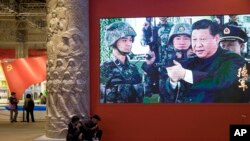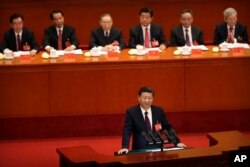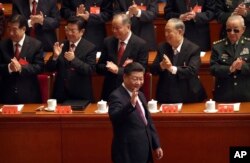China's increasingly powerful leader Xi Jinping has pledged to make the Communist Party more responsive to public demands and to calls for democracy, fairness and justice in a lengthy address to the 19th Party Congress.
But at least three cases involving the harassment of lawyers this week and an online crackdown as the party hosts top level political meetings raise serious questions about how he might do that.
Prior to Wednesday’s start of the twice-a-decade meetings, renowned human rights lawyer Yu Wensheng told the Associated Press thatthe party congress has been marked by pervasively tight security.
Tighter-than-ever security
“The security of the 19th party congress appears to be much tighter than before. Earlier during the [2015] July 9 crackdown, human rights lawyers and defenders were the main target [of arrests and detention]. But this time around, the target is broader to include rights defenders, petitioners and dissidents, many of whom have been arrested nationwide,” said Yu, who has released an open letter online to call for the impeachment of Xi and political reforms at the party congress.
He was taken Wednesday to the capital city’s judicial bureau for questioning.
It wasn’t clear whether the hours-long questioning was about Yu’s open letter or his lawyer’s license, which was confiscated in July after he had represented lawyer Wang Quanzhang. Wang has been in police custody since the lawyers crackdown two years ago.
Repeated calls to Yu after his release Thursday morning went unanswered. So too were those to the judicial bureau’s Chen Min and Lu Kai, both of whom reportedly questioned Yu.
Xi’s empty-worded pledges?
International rights groups say Yu’s case, as well as many other incidents of abuse of power by the security apparatus in China this week, create doubts about the sincerity of Xi’s calls for democracy and justice.
“What he’s [Xi] trying to say, apart from being rhetoric using some apparently new concept, it’s old wine in the new bottle,” said Kit Chan of China Human Rights Lawyers Concerned Group.
“The problem is, first, there’s never any concrete solid substance in whatever the leaders in China [have] portrayed like the socialist rule of law, the Chinese characteristics socialism or anything like that. So, it’s vague and you don’t really know what the content is. And that could then be easily manipulated and subject to the individuals’ interpretation,” the Hong Kong-based spokeswoman told VOA.
She said that without an effective check and balance mechanism, any meaningful political reform led by China’s one-party rule will be impossible.
On Wednesday, Xi called upon the party “to develop socialistic consultation-based democracy, facilitate a sound democratic system and diverse forms of democracy as well as to widen the path of democratization so that people can be empowered – a concept to be fully implemented throughout the nation and in the society.”
Abuse of power
Chan said the treatment of Zhejiang-based lawyer Li Boguang was another slap in Xi’s face while the top leader was painting a rosy picture about the Chinese Dream.
Li on Wednesday was allegedly beaten by a group of men with suspected links to the local government, who threatened to cut off his hands and feet after the lawyer filed a legal action against corrupt officials on behalf of his clients who lost their lands, Chan said, citing her group's confidential sources.
The rights activist questioned to what extent Xi’s policies can be applied to address the abuse of power by local governments and to ensure the rule of law. She said China has used the phrase "rule of law" to institutionalize and justify rights infringements.
Lawyer Ran Tong cited the case of his client Zi Su as another example of Communist Party intolerance toward dissidents.
Little tolerance for dissidents
Zi is an economics professor from Sichun and a Communist party member for 30 years. But he has been criminally detained on state subversion charges since early June after he openly urged the party congress to hold democratic elections to elect a replacement for Xi.
At least six other individuals across China are confirmed to have been detained for expressing support for Zi’s proposal online. All but one have been released, according to the rights group China Human Right Defenders.
“According to the party constitution, Zi made a proposal for the party to review. It’s up to the chairman to accept his proposal. But it’s wrong to have accused him of being a counter revolutionary simply because he has proposed a recommendation to the party,” Ran told VOA, adding that he found Zi’s subversion charges groundless.
He added that Zi’s treatment ran contrary to Xi’s pledges to promote democracy and tolerate any harsh criticism.
Aggressive online crackdown
On China’s social media, the crackdown on unfavorable comments is equally harsh.
More than a dozen media stories appeared online quoting Xi's call for the party to respond to public concerns, but comments on those stories were being blocked or erased in real time.
In one case, VOA watched on the Sina Weibo app – China's version of Twitter – as the number of comments on a story about Xi's remarks changed from 50 to just two.
On WeChat and other social media networks, users have been barred from changing their profile picture until the end of the month. Given China's tight social media restrictions, profile pictures are sometimes used to send subtle political messages. Even an English version of Xi's speech that someone posted was swooped up in the censorship dragnet.
WeChat has become increasingly popular, but just before the party congress began, new regulations went into effect that hold the organizers of private groups on WeChat or other social media group services responsible for the content of online discussions.






